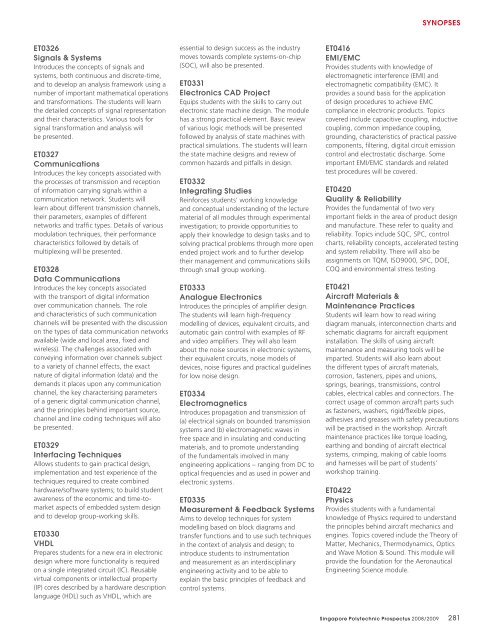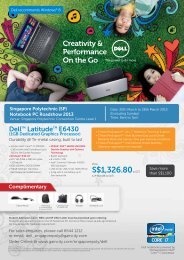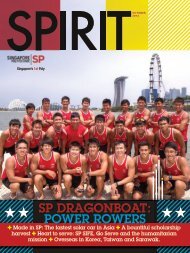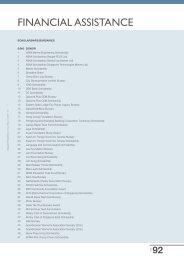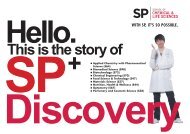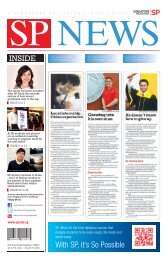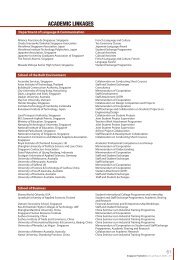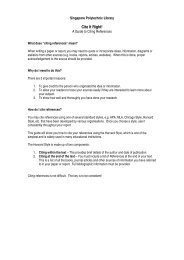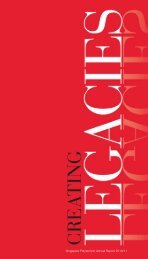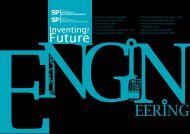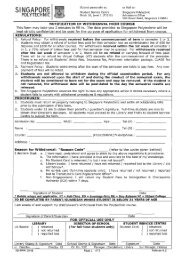SYNOPSES - Singapore Polytechnic
SYNOPSES - Singapore Polytechnic
SYNOPSES - Singapore Polytechnic
Create successful ePaper yourself
Turn your PDF publications into a flip-book with our unique Google optimized e-Paper software.
<strong>SYNOPSES</strong>ET0326Signals & SystemsIntroduces the concepts of signals andsystems, both continuous and discrete-time,and to develop an analysis framework using anumber of important mathematical operationsand transformations. The students will learnthe detailed concepts of signal representationand their characteristics. Various tools forsignal transformation and analysis willbe presented.ET0327CommunicationsIntroduces the key concepts associated withthe processes of transmission and receptionof information carrying signals within acommunication network. Students willlearn about different transmission channels,their parameters, examples of differentnetworks and traffic types. Details of variousmodulation techniques, their performancecharacteristics followed by details ofmultiplexing will be presented.ET0328Data CommunicationsIntroduces the key concepts associatedwith the transport of digital informationover communication channels. The roleand characteristics of such communicationchannels will be presented with the discussionon the types of data communication networksavailable (wide and local area, fixed andwireless). The challenges associated withconveying information over channels subjectto a variety of channel effects, the exactnature of digital information (data) and thedemands it places upon any communicationchannel, the key characterising parametersof a generic digital communication channel,and the principles behind important source,channel and line coding techniques will alsobe presented.ET0329Interfacing TechniquesAllows students to gain practical design,implementation and test experience of thetechniques required to create combinedhardware/software systems; to build studentawareness of the economic and time-tomarketaspects of embedded system designand to develop group-working skills.ET0330VHDLPrepares students for a new era in electronicdesign where more functionality is requiredon a single integrated circuit (IC). Reusablevirtual components or intellectual property(IP) cores described by a hardware descriptionlanguage (HDL) such as VHDL, which areessential to design success as the industrymoves towards complete systems-on-chip(SOC), will also be presented.ET0331Electronics CAD ProjectEquips students with the skills to carry outelectronic state machine design. The modulehas a strong practical element. Basic reviewof various logic methods will be presentedfollowed by analysis of state machines withpractical simulations. The students will learnthe state machine designs and review ofcommon hazards and pitfalls in design.ET0332Integrating StudiesReinforces students’ working knowledgeand conceptual understanding of the lecturematerial of all modules through experimentalinvestigation; to provide opportunities toapply their knowledge to design tasks and tosolving practical problems through more openended project work and to further developtheir management and communications skillsthrough small group working.ET0333Analogue ElectronicsIntroduces the principles of amplifier design.The students will learn high-frequencymodelling of devices, equivalent circuits, andautomatic gain control with examples of RFand video amplifiers. They will also learnabout the noise sources in electronic systems,their equivalent circuits, noise models ofdevices, noise figures and practical guidelinesfor low noise design.ET0334ElectromagneticsIntroduces propagation and transmission of(a) electrical signals on bounded transmissionsystems and (b) electromagnetic waves infree space and in insulating and conductingmaterials, and to promote understandingof the fundamentals involved in manyengineering applications – ranging from DC tooptical frequencies and as used in power andelectronic systems.ET0335Measurement & Feedback SystemsAims to develop techniques for systemmodelling based on block diagrams andtransfer functions and to use such techniquesin the context of analysis and design; tointroduce students to instrumentationand measurement as an interdisciplinaryengineering activity and to be able toexplain the basic principles of feedback andcontrol systems.ET0416EMI/EMCProvides students with knowledge ofelectromagnetic interference (EMI) andelectromagnetic compatibility (EMC). Itprovides a sound basis for the applicationof design procedures to achieve EMCcompliance in electronic products. Topicscovered include capacitive coupling, inductivecoupling, common impedance coupling,grounding, characteristics of practical passivecomponents, filtering, digital circuit emissioncontrol and electrostatic discharge. Someimportant EMI/EMC standards and relatedtest procedures will be covered.ET0420Quality & ReliabilityProvides the fundamental of two veryimportant fields in the area of product designand manufacture. These refer to quality andreliability. Topics include SQC, SPC, controlcharts, reliability concepts, accelerated testingand system reliability. There will also beassignments on TQM, ISO9000, SPC, DOE,COQ and environmental stress testing.ET0421Aircraft Materials &Maintenance PracticesStudents will learn how to read wiringdiagram manuals, interconnection charts andschematic diagrams for aircraft equipmentinstallation. The skills of using aircraftmaintenance and measuring tools will beimparted. Students will also learn aboutthe different types of aircraft materials,corrosion, fasteners, pipes and unions,springs, bearings, transmissions, controlcables, electrical cables and connectors. Thecorrect usage of common aircraft parts suchas fasteners, washers, rigid/flexible pipes,adhesives and greases with safety precautionswill be practised in the workshop. Aircraftmaintenance practices like torque loading,earthing and bonding of aircraft electricalsystems, crimping, making of cable loomsand harnesses will be part of students’workshop training.ET0422PhysicsProvides students with a fundamentalknowledge of Physics required to understandthe principles behind aircraft mechanics andengines. Topics covered include the Theory ofMatter, Mechanics, Thermodynamics, Opticsand Wave Motion & Sound. This module willprovide the foundation for the AeronauticalEngineering Science module.<strong>Singapore</strong> <strong>Polytechnic</strong> Prospectus 2008/2009 281


